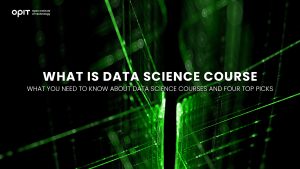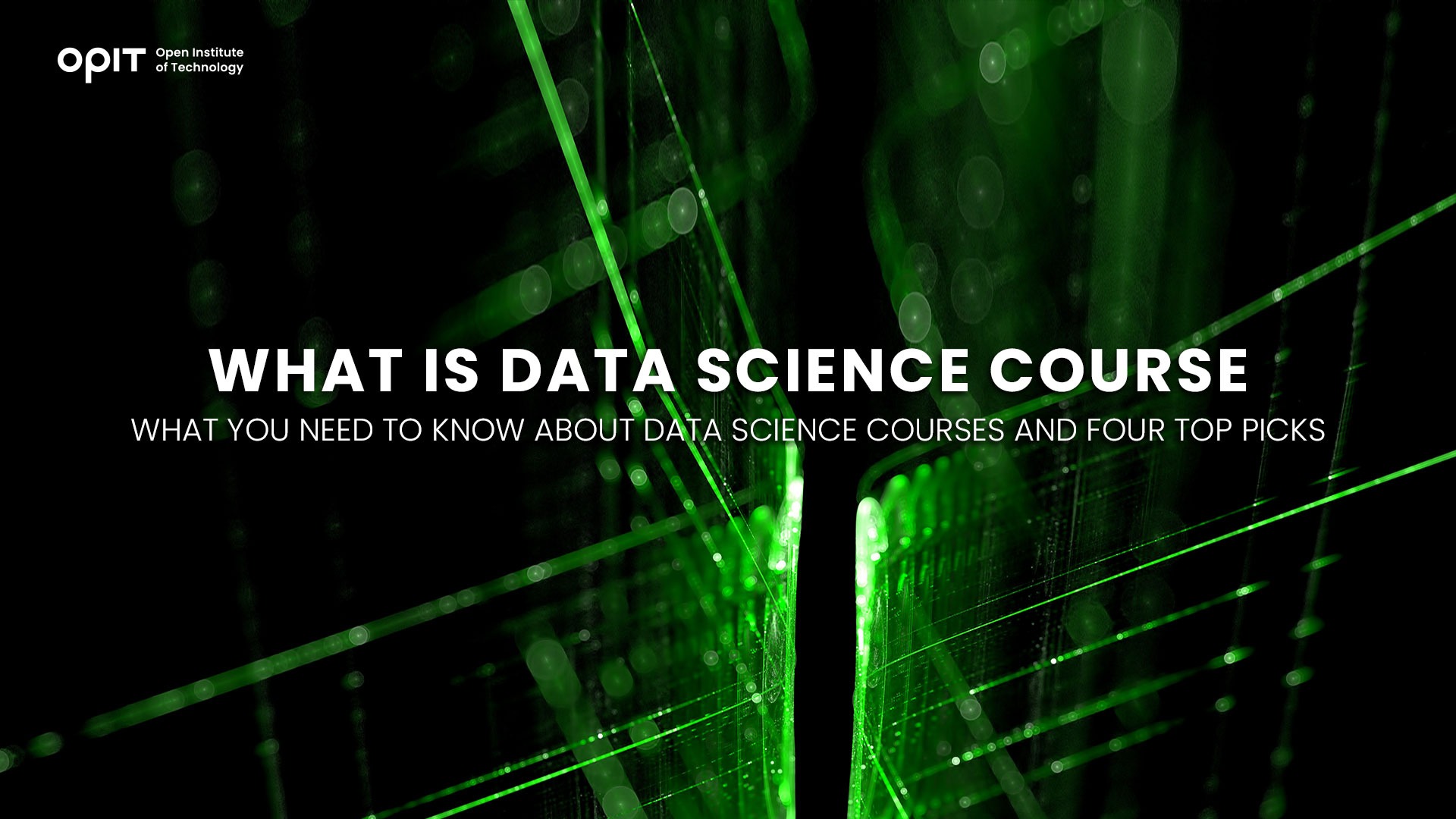Read the full article below (in Italian):


Combine mathematics with analytics, mix in programming skills, and add a dash of artificial intelligence, and you have the recipe for creating a data scientist. These professionals use complex technical skills to parse, analyze, and draw insights from complex datasets, enabling more accurate decision-making in the process.
As companies gather more data than ever before (both about their customers and themselves), these skills are in increasingly high demand. That’s demonstrated by data from the U.S. Bureau of Labor Statistics, which says that the number of data science jobs in the U.S. alone looks set to increase by 36% between 2021 and 2031.
That higher-than-average growth rate creates an opportunity for students, though grasping that opportunity requires a dedication to learning. This article explores the question of what is data science course material and highlights a selection of courses that set you on a data-propelled career path.
What to Expect From a Data Science Course
Answering the question of “what is data science course?” starts with examining the components of the typical course. Bear in mind that these components vary in nature and complexity depending on the specific course you take, though all are usually present.
Overview of Course Content
The content of a data science course is usually split into four core categories:
- Statistics and Probability – Math underpins everything a data scientist does, as they use numbers to spot patterns and determine the likelihood of various potential outcomes. Most data science courses delve into statistics and probability for this reason, with more advanced courses often requiring a degree in a field related to these areas.
- Programming – Whether it’s Python (the most popular data science programming language), R, or SQL, your course will teach you how to write in a language that machines understand.
- Data Visualization and Analysis – Anybody can collect reams of data. It’s the ability to visualize that data (and draw insights from it) that sets data scientists apart from other professionals. A good course equips you with the ability to use visualization tools to shine a spotlight on what a dataset actually tells you.
- Machine Learning and AI – The rise of machine learning transformed data science. Using algorithms created by data scientists, machines can analyze datasets presented to them and learn from the patterns to predict probabilities for different outcomes and even predict market trends. Your course will teach you how to create the algorithms that serve as a machine learning model’s “brain.”
Hands-On Projects and Real-World Applications
If you had the desire, you could read pages and pages on how to tune a car’s engine. But without practical and real-world wrench-in-hand experience working on an engine, you’ll never figure out how what you learn from books applies in the field.
The same line of thinking applies to data science, which is often so technically complex that it’s difficult to see how what you learn applies in the real world. A good data science course incorporates a real-world component through projects and exposure to faculty members who have direct experience in using the skills they teach.
Peer Collaboration and Networking
What is data science course for if not to learn how to become a data scientist? While learning the technical side is crucial, of course, a good course also puts you in contact with like-minded individuals who have the same (or similar) goals as you.
That contact helps you to build the collaborative skills you’ll need when you enter the workforce. But perhaps more importantly, it aids you in creating a network of peers who could lead you to job opportunities or work with you on entrepreneurial ventures.
Top Data Science Courses Available
With the components of a data science course established, you have a vital question to answer – what data science course should you take? The following are four suggestions (two online courses and two university courses) that give you a solid grounding in the subject.
Online Courses
Taking a data science course online gives you flexibility, though you may miss out on some of the collaborative and networking aspects that university-led courses provide.
Course 1 – What Is Data Science? (IBM via Coursera)
Coming with the stamp of approval from IBM, a leading name in the computer science field, this nine-hour course is suitable for beginners who want a self-paced learning approach. It’s part of a multi-part program (the IBM Data Science Professional Certificate) that’s designed to give you an industry-recognized qualification that could fast-track your entry into the field.
As for the course itself, it’s split into three parts, each containing multiple instructor-led videos and quizzes to test what you’ve learned. By the end, you’ll understand what data scientists do, build a basic understanding of various data science-related topics, and see how the profession relates to the modern business world. Granted, the course offers a surface-level understanding of the subject, with more complex topics examined in other classes. But it’s a superb tool for developing the foundation on which you can build with other courses.
Course 2 – Introduction to Data Science With Python (Harvard via edX)
Where IBM’s course equips you with general knowledge, Harvard’s online offering digs into the practical side of data science. Specifically, it focuses on using Python (and its many libraries) to solve data science problems drawn from real-world examples.
The course takes eight weeks, with study time between three and four hours per week. Ultimately, this class helps you build on your established programming skills and shows you how to apply them in a data science context.
As you may have guessed, that mention of building on existing skills means you’ll need a solid understanding of Python to participate in this free course. But assuming you have that, Harvard’s class is ideal for showing you just how flexible the language can be, especially when developing machine learning algorithms. Furthermore, simply having the word “Harvard” on your online certification adds credibility to your CV when you start applying for jobs.
University Programs
University programs demand a larger time (and monetary) commitment than purely online programs, though the upside is that you get a more prestigious qualification at the end. These two courses are ideal, with one even being a hybrid of online and university-level courses.
Course 1 – Master in Applied Data Science & AI (OPIT)
Let’s get the obvious out of the way first – you’ll need a BSc degree, or an equivalent, in a computer science or mathematical subject to take OPIT’s data science Master’s degree course.
Assuming you meet that prerequisite, this course comes in 18 and 12-month varieties, with the latter being a fast-tracked version that delivers the same content while asking you to dedicate more time to studying. It costs €6,500 to take, though early bird discounts are available, and an EU-accredited university delivers it.
The course eschews traditional exams by taking a progressive assessment approach to determine how well you’re absorbing the materials. It’s also focused on the practical side of things, with the application of data science in business problem-solving and communication being core modules.
Course 2 – MSc in Social Data Science (University of Oxford)
As the world’s leading university for seven consecutive years, according to Times Higher Education (THE) World University Rankings, the University of Oxford has outstanding credentials. And its MSc in Social Data Science is an interesting course to take because it specializes in a specific subject area – human behavior.
The degree stands on the precipice of an emerging field as it focuses on using data science to analyze, critique, and reevaluate existing social processes. It combines general machine learning models with more specialized data science tools, such as natural language processing and computer vision, to equip students with a high degree of technical knowledge.
That knowledge doesn’t come cheap, either in time or monetary commitment. The University of Oxford expects students to devote 40 hours per week to study, with overseas students having to pay £30,910 (approx. €35,795) to participate. While these investments are naturally intimidating, the university’s prestige makes the time and money you spend worthwhile when you start speaking to employers.
Factors to Consider When Choosing a Data Science Course
The four courses presented here each offer something different in terms of delivery and the expertise required of the student to participate. When choosing between them (and any other courses you find), you should consider the following questions:
- Does the course content and curriculum align with your career goals?
- Can you make time for the course within your schedule, and how much flexibility does it offer?
- Do the instructors provide the expertise you need and teach in a style that suits your preferred way of learning?
- Will you get an adequate return on your investment, both in terms of the prestige of the certification you receive and the knowledge you gain?
- Have past (or current) students recommended the course as a good option for prospective data scientists?
The Benefits of Completing a Data Science Course
Given the technical nature of the subject, you may be asking yourself what is data science course content going to deliver in terms of benefits to your life. The answers are as follows:
- Your skills improve your job prospects by putting you in pole position to enter a market that’s set for substantial growth over the next 10 years.
- The problem-solving and analytical tools you gain are useful in the data science field and other career paths.
- Any course you select puts you in contact with industry professionals who offer networking opportunities that could lead to a new job.
- You get to learn about (and experiment with) cutting-edge tools and technologies that will become the standard for modern business, and more, in the coming years.
What Is Data Science Course – It’s Your Route Into a Great Career
Let’s conclude by reiterating something mentioned at the start of the article – the data science sector will grow by 36% over the next decade or so.
That growth alone demonstrates the importance of data science, as well as why choosing the right course is so critical to your future success. With the right course, you make yourself a desirable candidate to organizations that are quickly accepting that they need data scientists to help them make decisions for the future.
Related posts

Source:
- Agenda Digitale, published on June 16th, 2025
By Lokesh Vij, Professor of Cloud Computing Infrastructure, Cloud Development, Cloud Computing Automation and Ops and Cloud Data Stacks at OPIT – Open Institute of Technology
NIST identifies five key characteristics of cloud computing: on-demand self-service, network access, resource pooling, elasticity, and metered service. These pillars explain the success of the global cloud market of 912 billion in 2025
Read the full article below (in Italian):

You’ve probably seen two of the most recent popular social media trends. The first is creating and posting your personalized action figure version of yourself, complete with personalized accessories, from a yoga mat to your favorite musical instrument. There is also the Studio Ghibli trend, which creates an image of you in the style of a character from one of the animation studio’s popular films.
Both of these are possible thanks to OpenAI’s GPT-4o-powered image generator. But what are you risking when you upload a picture to generate this kind of content? More than you might imagine, according to Tom Vazdar, chair of cybersecurity at the Open Institute of Technology (OPIT), in a recent interview with Wired. Let’s take a closer look at the risks and how this issue ties into the issue of responsible artificial intelligence.
Uploading Your Image
To get a personalized image of yourself back from ChatGPT, you need to upload an actual photo, or potentially multiple images, and tell ChatGPT what you want. But in addition to using your image to generate content for you, OpenAI could also be using your willingly submitted image to help train its AI model. Vazdar, who is also CEO and AI & Cybersecurity Strategist at Riskoria and a board member for the Croatian AI Association, says that this kind of content is “a gold mine for training generative models,” but you have limited power over how that image is integrated into their training strategy.
Plus, you are uploading much more than just an image of yourself. Vazdar reminds us that we are handing over “an entire bundle of metadata.” This includes the EXIF data attached to the image, such as exactly when and where the photo was taken. And your photo may have more content in it than you imagine, with the background – including people, landmarks, and objects – also able to be tied to that time and place.
In addition to this, OpenAI also collects data about the device that you are using to engage with the platform, and, according to Vazdar, “There’s also behavioral data, such as what you typed, what kind of image you asked for, how you interacted with the interface and the frequency of those actions.”
After all that, OpenAI knows a lot about you, and soon, so could their AI model, because it is studying you.
How OpenAI Uses Your Data
OpenAI claims that they did not orchestrate these social media trends simply to get training data for their AI, and that’s almost certainly true. But they also aren’t denying that access to that freely uploaded data is a bonus. As Vazdar points out, “This trend, whether by design or a convenient opportunity, is providing the company with massive volumes of fresh, high-quality facial data from diverse age groups, ethnicities, and geographies.”
OpenAI isn’t the only company using your data to train its AI. Meta recently updated its privacy policy to allow the company to use your personal information on Meta-related services, such as Facebook, Instagram, and WhatsApp, to train its AI. While it is possible to opt-out, Meta isn’t advertising that fact or making it easy, which means that most users are sharing their data by default.
You can also control what happens with your data when using ChatGPT. Again, while not well publicized, you can use ChatGPT’s self-service tools to access, export, and delete your personal information, and opt out of having your content used to improve OpenAI’s model. Nevertheless, even if you choose these options, it is still worth it to strip data like location and time from images before uploading them and to consider the privacy of any images, including people and objects in the background, before sharing.
Are Data Protection Laws Keeping Up?
OpenAI and Meta need to provide these kinds of opt-outs due to data protection laws, such as GDPR in the EU and the UK. GDPR gives you the right to access or delete your data, and the use of biometric data requires your explicit consent. However, your photo only becomes biometric data when it is processed using a specific technical measure that allows for the unique identification of an individual.
But just because ChatGPT is not using this technology, doesn’t mean that ChatGPT can’t learn a lot about you from your images.
AI and Ethics Concerns
But you might wonder, “Isn’t it a good thing that AI is being trained using a diverse range of photos?” After all, there have been widespread reports in the past of AI struggling to recognize black faces because they have been trained mostly on white faces. Similarly, there have been reports of bias within AI due to the information it receives. Doesn’t sharing from a wide range of users help combat that? Yes, but there is so much more that could be done with that data without your knowledge or consent.
One of the biggest risks is that the data can be manipulated for marketing purposes, not just to get you to buy products, but also potentially to manipulate behavior. Take, for instance, the Cambridge Analytica scandal, which saw AI used to manipulate voters and the proliferation of deepfakes sharing false news.
Vazdar believes that AI should be used to promote human freedom and autonomy, not threaten it. It should be something that benefits humanity in the broadest possible sense, and not just those with the power to develop and profit from AI.
Responsible Artificial Intelligence
OPIT’s Master’s in Responsible AI combines technical expertise with a focus on the ethical implications of AI, diving into questions such as this one. Focusing on real-world applications, the course considers sustainable AI, environmental impact, ethical considerations, and social responsibility.
Completed over three or four 13-week terms, it starts with a foundation in technical artificial intelligence and then moves on to advanced AI applications. Students finish with a Capstone project, which sees them apply what they have learned to real-world problems.
Have questions?
Visit our FAQ page or get in touch with us!
Write us at +39 335 576 0263
Get in touch at hello@opit.com
Talk to one of our Study Advisors
We are international
We can speak in:


